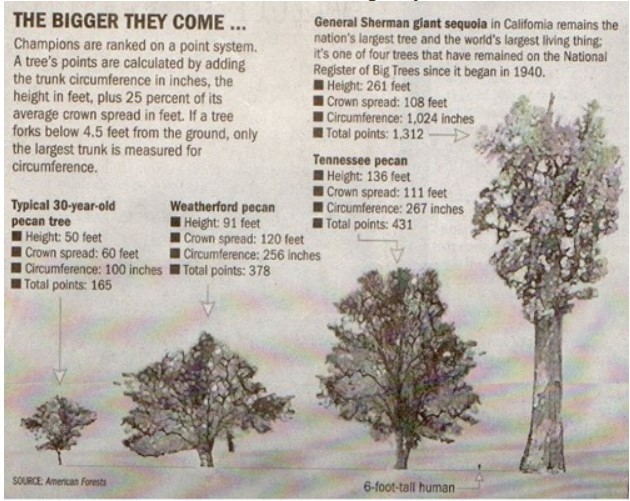'The Pecan is Practically an Orchard by Itself': Giant Among Trees Loses Crown

A 136-foot Tennessee Pecan tree has bested Weatherford resident Billy Finch's 91-foot defending champion. Photo by The Dallas Morning News Staff Photographer Tom Fox.

Published December 17, 2012, By MIKE PETERS
No amount of rooting can restore distinction to Texas specimen.
WEATHERFORD - Billy Finch has one tough Pecan tree. You name it - from pernicious weather to sap-thirsty insects - nothing has beaten that tree.
Nothing, that is, until a Tennessee Pecan tree one-upped the defending champion from Texas.
Ours is 91 feet tall and 256 inches around. Ours has a bigger spread - 120 feet to 111 feet - but that's not enough to keep the title.
"You gotta be kidding!" exclaimed local arborist Steve Houser upon hearing the news.
The Pecan, after all, has been Texas' state tree since 1919; Governor James Hogg loved the sturdy giants so much that he asked that one be planted at his gravesite. Heck, they're all over the Alamo.
Truth is, Texas and Tennessee have grappled for the Pecan championship for years, said Karen Fedor of the nonprofit conservation organization American Forests, which has chronicled the nation's biggest trees since 1940. The new champ has been nominated before, but there was "some controversy surrounding the Tennessee tree because it was thought to be a Black Walnut," she said. "However, it was confirmed to be a Pecan, remeasured and renominated in 2001."
As tree lovers celebrated National Arbor Day on Friday, though, some can set aside regional rivalries.
"Even though it's our state tree, Pecans are important trees in many states, especially in the Eastern United States," said Dallas urban forester Courtney Blevins, who maintains the Texas Forest Service records for the biggest local trees.
There, they even pronounce it like we do - pe-CAHN, not PEE-can.
"It's a wonderful tree," said Kay Fermann, champion tree coordinator for Tennessee.
SEE IT YOURSELF
To get to Billy Finch's home, take Interstate 20 west of Fort Worth for 25 miles to FM51. He's at 2712 FM51, in a white house on the east side of the highway on the north side of town.

BIG TREES BY THE NUMBERS
The easiest national champion to see nearby: Common Jujube, at the Fort Worth Botanical Garden. It's 46 feet tall, with a 64-inch circumference and a 36-foot spread; 119 total points.
Most difficult national champion tree to see in Texas: Huisache, inside the grounds of the Atascosa County Jail. It's 30 feet tall with a 161-inch circumference and 46-foot spread; 203 total points.
States with most national champions:
Florida: 169
California: 97
Arizona: 70
Texas: 69
Virginia: 56
States with the fewest national champions: Oklahoma, five other states and the District of Columbia have no national champions.
How did Arizona pass us? How big can their trees be when it never rains there? Answer: They have many specimens that are unique to the state (as does Texas).
Could a new champion be in your back yard? More than 90 tree species have no recognized champions, including the Texas Hawthorn, Texas Forestiera, Texas Kidneywood and Texas Pistache.
Silliest excuse for a national champion tree: Saguaro. Who let Arizona get away with this? Sure, it's 50 feet tall, but is it a tree? Disqualify this species and Texas is back in third place (but who's counting?).
